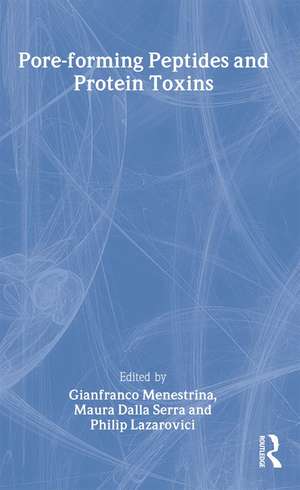Pore-forming Peptides and Protein Toxins: Cellular and Molecular Mechanisms of Toxic Action
Editat de Gianfranco Menestrina, M. Dalla Seraen Limba Engleză Hardback – 30 ian 2003
Pore-forming Peptides and Protein Toxins describes how natural and synthetic peptides and toxins form pores and ionic channels that cause cell membrane collapse and cell death. Divided into two parts on pore-forming proteins and pore-forming peptides, each chapter reviews the normal physiological cellular structure and function, discusses the interference of toxins with this process, and considers the use of specific toxins in research. Written by researchers from around the world, the text includes such topics as the channel-forming properties of Helicobacter pylori and the role of amyloid peptide channels in the development of amyloid diseases.
This authoritative volume provides a multidisciplinary approach to understanding the basic principles and cellular mechanisms of the action of toxins and their potential use as research tools. It is an essential work for researchers and students in the fields of biochemistry, toxicology, biophysics, and pharmaceutical science.
Preț: 1188.77 lei
Preț vechi: 1672.10 lei
-29% Nou
Puncte Express: 1783
Preț estimativ în valută:
227.47€ • 237.49$ • 188.26£
227.47€ • 237.49$ • 188.26£
Comandă specială
Livrare economică 15-29 martie
Doresc să fiu notificat când acest titlu va fi disponibil:
Se trimite...
Preluare comenzi: 021 569.72.76
Specificații
ISBN-13: 9780415298520
ISBN-10: 0415298520
Pagini: 348
Dimensiuni: 174 x 246 x 22 mm
Greutate: 0.84 kg
Ediția:1
Editura: CRC Press
Colecția CRC Press
Seria Cellular and Molecular Mechanisms of Toxic Action
ISBN-10: 0415298520
Pagini: 348
Dimensiuni: 174 x 246 x 22 mm
Greutate: 0.84 kg
Ediția:1
Editura: CRC Press
Colecția CRC Press
Seria Cellular and Molecular Mechanisms of Toxic Action
Public țintă
ProfessionalCuprins
PART 1 PORE-FORMING PROTEINS. Staphylococcal Bicomponent Leucotoxins, Mechanisms of Action, Impact on Cells and Contribution to Virulence. The Formulation of Ion-permeable Channels by RTX-toxins in Lipid Bilayer Membranes: Basis for Their Biological Activity. Properties of the Monomeric and the Pentameric Pseudomonas Cytotoxin. Helicobacter pylori Vacuolating Toxin VacA: Channel-forming Properties and Cell Intoxication. Delta-endotoxin Mode of Action. Functional Studies of Helix a-5 Region from Bacillus Thuringiensis Cryl1Ab d-endotoxin. Colicin Channels and Protein Translocation: Parallels with Diphtheria Toxin. Actinoporins, Pore-forming Toxins of Sea Anemones (Actiniaria). PART 2 PORE-FORMING PEPTIDES. Structural and Change Requirements for Antimicrobial Peptide Insertion into Biological and Model Membranes. Pardaxins - Pore-forming Neurotoxins as Pharmaceutical Tools in Dissecting Neurotransmitter Exocytosis and Neurotoxicity. Cecropin-melittin Hybrid Peptides as Versatile Templates in the Development of Membrane-active Antibiotic Agents. The Syringomycins: Lipodepsipeptide Pore Formers from Plant Bacterium Pseudomonas syringae. Molecular Mechanisms of Action of Syringopeptins, Antifungal Peptides from Pseudomonas syringae pv. syringae. The Role of Amyloid Peptide Channels in Amyloid Disease.
Notă biografică
Gianfranco Menestrina, M. Dalla Sera
Descriere
Pore-forming proteins and peptides play a central role in bacterial pathogenesis, the immune response, venomous attack, and innate immunity. Pore-forming Peptides and Protein Toxins describes how natural and synthetic peptides and toxins form pores and ionic channels that cause cell membrane collapse and cell death. Written by researchers from around the world, it discusses such topics as the channel-forming properties of Helicobacter pylori and the role of amyloid peptide channels in the development of amyloid diseases. This text provides a multidisciplinary approach to understanding the basic principles and cellular mechanisms of the actions of toxins and their potential use as research tools.


